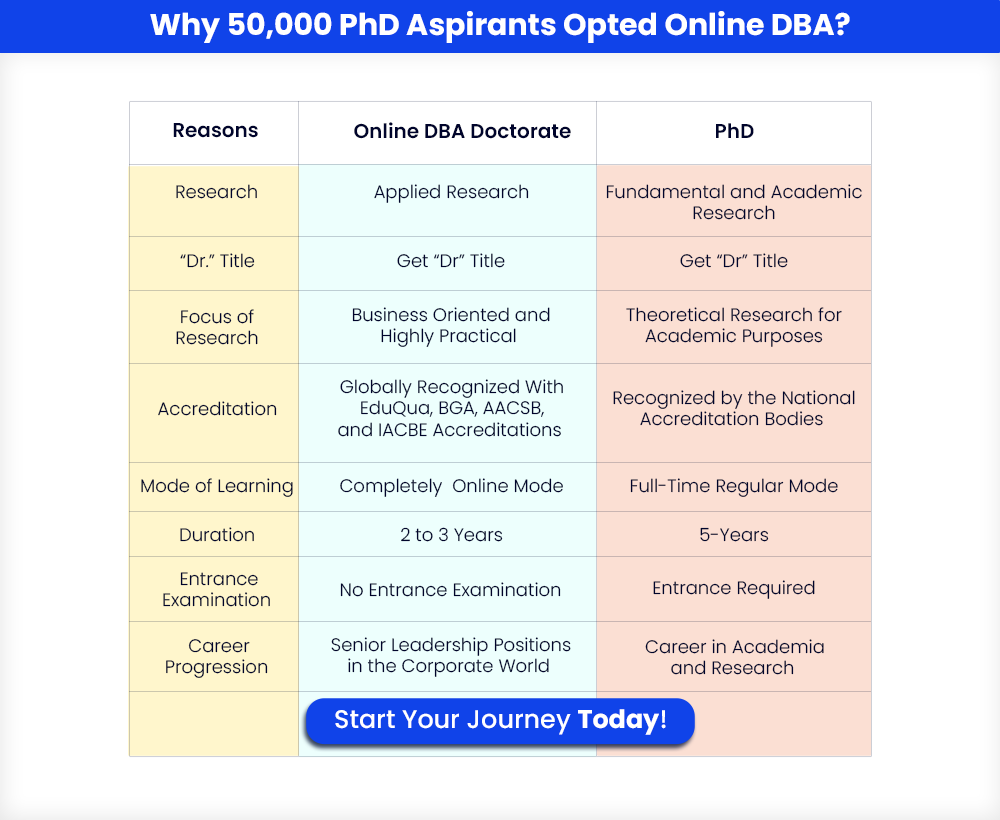Expert Interviews
- University Reviews
- Career Guide
 Video Counseling
Video CounselingImportant Facts
- Ask any Question - CV Forum

PhD In Economics Explained: Eligibility, Fees, Admission 2026
Muhammad Hasim Sheikh Jan 22, 2026 1.3K Reads

PhD (Doctor of Philosophy) in Economics is a terminal degree in the field of economics. PhD in Economics is considered the highest qualification and the individuals who have completed this degree are awarded a doctorate.
PhD in Economics is a doctoral degree and individuals pursuing it get advanced research and analysis in this field. Individuals who are eager to conduct original research in economic theory, policy, or applied economics can pursue this degree.
|
Working Professionals Also Looking For |
|
PhD in Economics can be pursued after completing a master's degree in Economics. However, some universities allow students to pursue a PhD degree in Economics with any master’s degree. PhD in Economics is highly beneficial for careers in academia and various sectors of diverse industry.
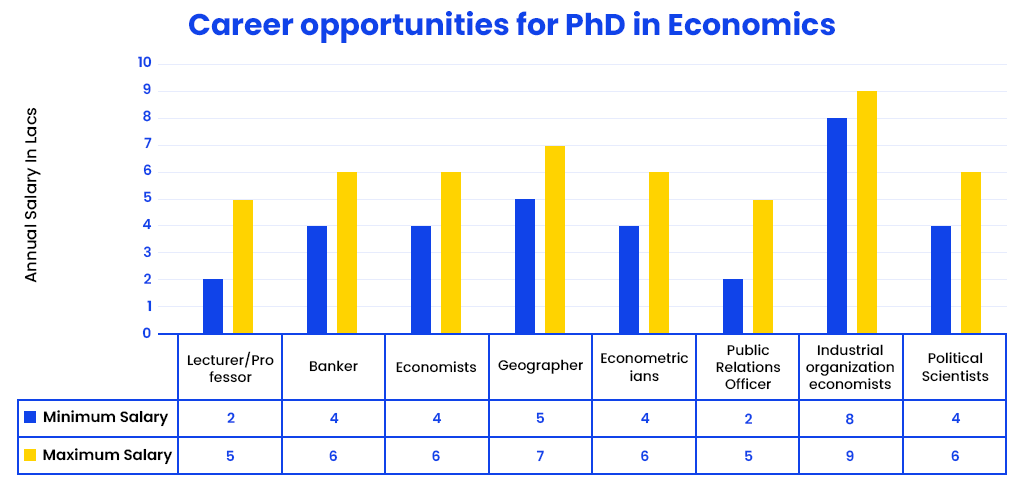
PhD in Economics emphasizes on research and PhD candidates are expected to produce a well-researched dissertation. The dissertation must include all the research and findings during the PhD that can contribute to the field of knowledge.
Duration of PhD in Economics
The duration of the PhD program depends upon the type of PhD. Generally, the duration of a Full-Time PhD in Economics ranges from 3 Years to 5 Years which can be further extended to 7 Years.
The duration of a Part-Time PhD in Economics ranges from 4 Years to 7 Years:
|
Working Professionals Also Looking for |
|
However, working professionals looking for a doctorate that can accommodate their professional obligations and academic learning can enroll for an Online DBA (Doctorate of Business Administration). The duration of an Online DBA is just 3 Years and business executives can pursue it without quitting their jobs.
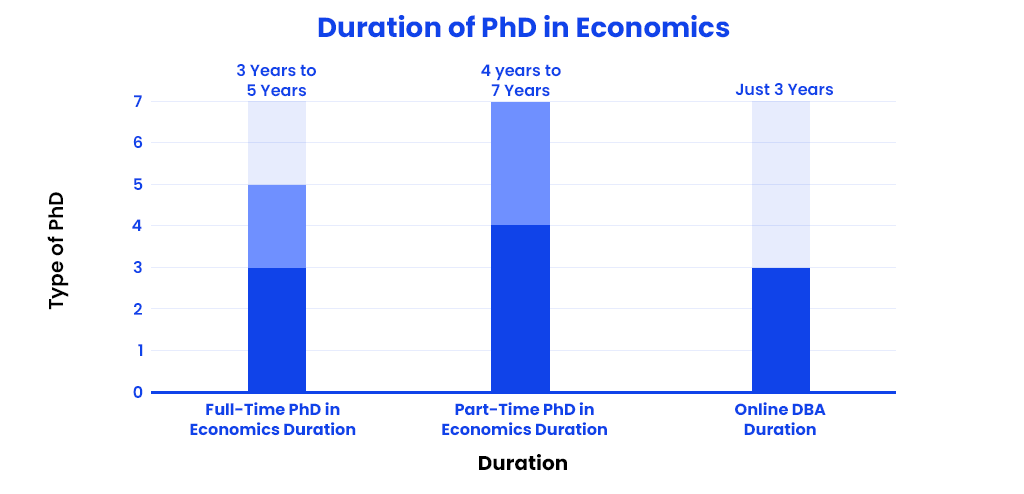
PhD in Economics Program Highlights
Here are the major highlights of a PhD program in Economics. The table below demonstrates the full details regarding PhD in Economics and gives a brief idea about PhD in Economics full form, PhD in Economics duration, PhD in Economics eligibility requirements, entrance exams for PhD in Economics, best universities and colleges for PhD in Economics, etc.
|
Particulars |
Details |
|
Course Name |
PhD in Economics |
|
PhD in Economics Full-Form |
Doctor of Philosophy in Economics |
|
PhD in Economics Level |
Doctorate |
|
PhD in Economics Duration |
3 Years to 5 Years (Can be extended to 6-7 years ) |
|
PhD in Economics Eligibility |
Master’s degree in Economics |
|
PhD in Economics Entrance Exams |
|
|
PhD in Economics Selection Criteria |
Personal Interview and Research Proposal |
|
PhD in Economics Top Universities |
Jawaharlal Nehru University (JNU), Jamia Millia Islamia (JMI), Chandigarh University, Manipal University. |
|
PhD in Economics Course Fees |
INR 3900 to INR 6,50,0000 |
Why Pursue PhD in Economics?
Before enrolling in a PhD program in Economics, the benefits and the reasons for pursuing this program must be discussed. Individuals who wish to pursue this program must have a great interest in the field of economics.
PhD IN Economics offers a great opportunity to individuals who are willing to conduct original research in the field of Economics. PhD candidates have a significant research opportunity in economic theory, policy, or applied economics.
Candidates enrolled in the PhD program in Economics get a highly research-oriented curriculum that begins with comprehensive coursework. The coursework provides a strong foundation in the field of economics with courses in macroeconomics, microeconomics, and econometrics.
This is highly beneficial for conducting in-depth research on the selected research topic. The coursework is followed by extensive research work and dissertation writing. With the original research work in the Economics domain, an individual can contribute in the field of economics with an original research work.
This opens doors to a wide range of career opportunities in numerous industries in the field. PhD graduates in economics can also make a great career in academia.
PhD in Economics Eligibility Criteria
Universities and Institutes offering PhD programs in Economics have a set of eligibility requirements for admissions. Candidates aspiring to pursue PhD in Economics must fulfill this requirement to get admission to this program. Candidates who are interested in pursuing PhD in Economics must have completed their master's in Economics. Although, there are universities that allow students from any background to pursue this program.
Here are the eligibility criteria for PhD in Economics:
- Master’s degree in Economics from a recognized and approved University.
OR
- Master's degree in any discipline from a recognized and approved University. (This depends on the particular university and all universities do not allow it).
- Scored at least 60% marks in aggregate at the master’s level.
- Qualified for national-level entrance tests such as UGC NET, and GATE.
- Candidates in their final year of master’s degree can also apply.
|
PhD in Economics Eligibility Criteria |
|
|
Academic Requirement for PhD in Economics |
MA in Economics, MSc in Economics, MPhil in Economics |
|
Minimum Marks for PhD in Economics |
Minimum 60 Percent in aggregate. |
|
Age Limit for PhD in Economics |
No Age Limit |
Entrance Tests for PhD in Economics
Admissions to the PhD program in Economics is entertained based on various entrance tests conducted throughout the country. Apart from this, universities also conduct entrance tests for students who have not qualified for any national or state-level entrance tests for admission in PhD program in Economics.
Here are some of the most popular and well-known entrance tests for admission to PhD programs:
- UGC-NET: This is a national-level entrance exam conducted throughout India twice a year. The exam is conducted by the University Grants Commission (UGC) through the National Testing Agency (NTA). Generally, exams for UGC NET are conducted in June and December every year.
- GATE: GATE is also a national-level exam that is conducted for admission to PhD in Economics in top and premier institutes in India. Generally, the GATE exams are conducted in February every year.
- IIM PhD: Indian Institute of Management also conducts entrance tests for the candidates who are interested in PhD in Economics. Candidates aspiring to pursue their PhD in Economics from IIM can take this test.
- University-Specific Tests: Apart from the above-mentioned entrance tests, universities offering PhD in Economics also conduct entrance tests for admission to this program. Students who could not qualify for the entrance tests can attend university-specific entrance tests for admission in PhD in Economics.
Admission Process for PhD in Economics
The admission process for PhD in Economics is almost similar in all the universities across India. However, universities have full liberty in deciding the admission process for a PhD. PhD aspirants in economics can secure their admission by following these steps:
Application Submission:
- Step 1: Select the appropriate university that offers PhD in Economics.
- Step 2: Go through the eligibility requirements and check whether you fulfill those eligibility requirements.
- Step 3: Visit the official website of the university and select the admission section.
- Step 4: Register yourself and fill out the application form for PhD in Economics.
- Step 6: Attach the documents required by the university.
- Step 5: Review the application form and pay the application fees.
Written Test:
After submitting the application form, the university issues admit cards for written entrance tests. Applicants who have filled out the application form are required to appear for the entrance exam. Most universities provide exemptions in the entrance exams to students who have qualified in any national level PhD entrance exam such as UGC NET.
Personal Interview and Research Proposal:
Candidates who qualify for the written entrance test and those who were exempted from the written entrance test will be called for a personal interview.
Candidates will have to prepare a detailed research proposal and appear before the Departmental Research Committee (DRC) for an interview. They need to defend their research proposal in the interview. A merit list will be prepared once all the candidates are done with the interview.
Admission Offer :
Candidates will get admission offer as per their rank in the merit list. Candidates receiving the admission offer can accept it by paying the admission fees:
|
Popular PhD Specialization In India! |
|
PhD in Economics: Syllabus and Course Details
|
PAPER I) COURSE ON RESEARCH METHODOLOGY |
PAPER II) ADVANCED TOPICS IN ECONOMICS |
|
Unit 1: Micro and Macro Economics
|
|
Unit 2: International Trade, International Finance, Corporate Finance
|
|
|
|
|
|
|
UGC- NET Syllabus for Economics
Here is the latest and most updated syllabus for UGC-NET in Economics:
|
Economics UGC- NET Syllabus |
||
|
Unit-1: Micro Economics |
Unit-2: Macro Economics |
|
|
|
|
|
Unit- 3: Statistics and Econometrics |
Unit-4: Mathematical Economics |
|
|
|
|
|
Unit-5: International Economics |
Unit-6: Public Economics |
|
|
|
|
|
Unit-7: Money and Banking |
Unit-8: Growth and Development Economics |
|
|
|
|
|
Unit-9: Environmental Economics and Demography |
Unit-10: Indian Economy |
|
|
|
|
PhD in Economics Fellowships In India
Students enrolled in PhD in Economics get financial assistance through numerous fellowships and Scholarships to continue their research uninterrupted. To get these fellowships, PhD students may be required to qualify for certain examinations.
Fellowship significantly removes the financial constraints in the research process and helps to produce high-quality research. Here are some of the top PhD in Economics fellowships and scholarships in India:
|
PhD in Economics Fellowships |
Amount |
|
UGC-NET JRF |
INR 37000 P.M to INR 42000 P.M |
|
Prime Minister's Fellowship for Doctoral Research |
Upto 8,70,000 Per Annum |
|
Prime Minister Research Fellowship(PMRF) |
INR 80,000 P.M to 1,00,000 P.M |
|
Institute of Economic Growth |
INR 20,000 PM (20,000 P.A Contengency Grant) |
|
Jawaharlal Nehru Memorial Fund Scholarships |
INR 18,000 P.M |
Best Universities for PhD in Economics
PhD in Economics is offered by some of the top and highly accredited universities and institutes in India. These universities provide cutting-edge research opportunities to conduct high-quality research in the field of economics.
These universities provide highly experienced faculty who have significant experience in research supervision in the field of Economics. PhD in Economics is offered by both private and public universities in India.
Best Public Universities in India for PhD in Economics
Here is the list of some of the best public universities that offer PhD in Economics:
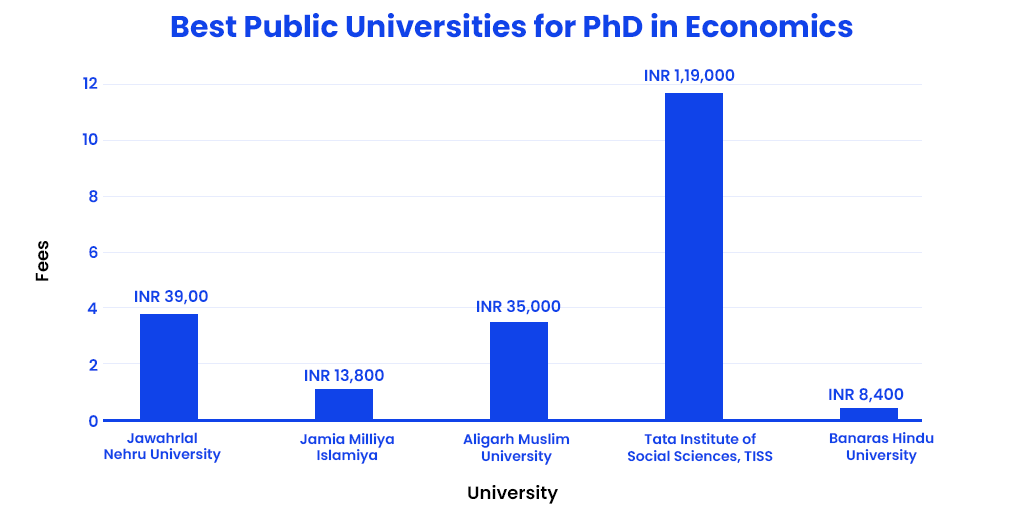
However, PhD students willing to pursue their doctoral degree from a globally renowned international university with much flexibility and accessibility can join Online DBA (Doctorate of Business Administration). This program is highly flexible and provides advanced research aptitude and expertise in business management and administration.
Best Private Universities in India for PhD in Economics
Here is the list of some of the top private universities in India for PhD in Economics:
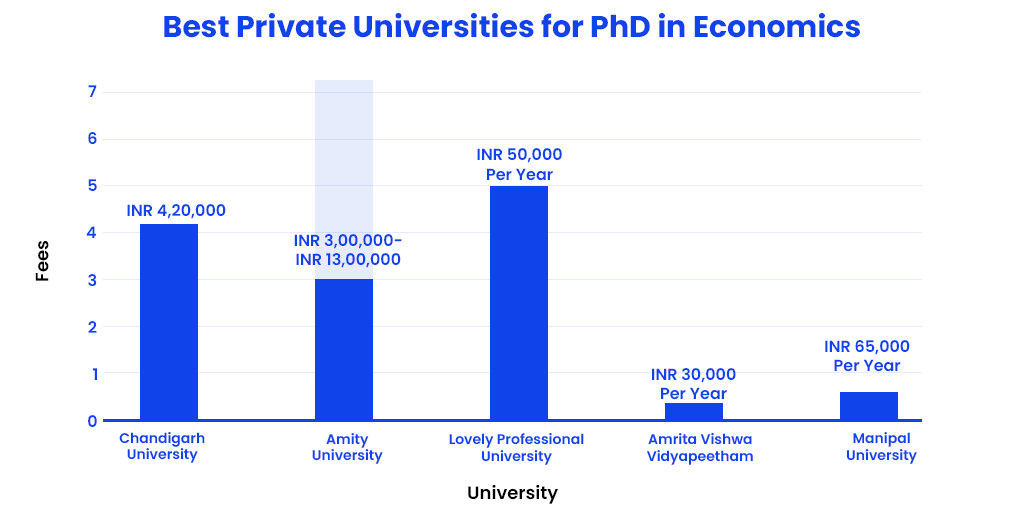
Fields of Research in PhD Economics
PhD in Economics incorporates a wide range of research fields. Here is the list of different fields of research in PhD Economics:
- Agricultural Economics
- Financial Economics
- Labour Economics
- Industrial Economics
- International Economics
- Business Economics
- Banking Economics
- Environmental Economics
- Developmental Economics
- Rural Economics and Rural Development
- Econometrics
Career Opportunities for PhD in Economics
PhD in Economics is highly beneficial for rewarding career opportunities in academia and a wide range of industries. Here are some of the top career opportunities available upon completion of PhD in Economics:
|
Job Profiles |
Average Salary |
|
Lecturer/Professor |
INR 6.00 LPA |
|
Banker |
INR 4.67 LPA |
|
Economists |
INR 4.55 LPA |
|
Geographer |
INR 5.14 LPA |
|
Econometricians |
INR 4.78 LPA |
FAQs (Frequently Asked Questions)
Yes, PhD in Economics is an excellent choice for the advanced and in-depth knowledge and expertise with a wide range of rewarding careers in the field of economics. The program is offered by some of the renowned universities in India under the supervision of highly experienced faculty.
The duration of PhD in Economics depends upon the type of PhD program. The duration of a Full-Time PhD program ranges from 3 Years to 5 Years. The duration of Part-Time PhD in Economics ranges from 4 years to 7 Years. However, business executive can complete their doctoral degree in just 3 years by enrolling in Online DBA.
Yes, you can get admission in PhD in Economics without qualifying for UGC-NET. You can appear for the entrance test conducted by the universities and qualify to get admission to PhD in Economics. However, to get admission to premier institutes such as the Indian Institute of Mangement (IIM), a UGC NET qualification is mandatory.
If you enroll in a Full-Time PhD in Economics, then you are required to leave your job. However, you can continue your job with a doctoral degree by enrolling in Online DBA.
Post Completion of PhD in Economics, you can make a highly rewarding career as a Lecturer, Banker, Economist, Geographer, Econometricians, etc.

10 Years of Experience / Storyteller / Research-driven Writer
As an Academic Content Writer and Content strategist, I have great experience in crafting high-quality, research-based content across diverse subjects. My academic background with a doctorate in business Management allows me to create informative and engaging academic materials for students, educators, and institutions. I have expertise in developing well-researched course materials, academic blog
Every query is essential.
Our team of experts, or experienced individuals, will answer it within 24 hours.
Recommended for you
Tired of dealing with call centers!
Get a professional advisor for Career!
LIFETIME FREE
Rs.1499(Exclusive offer for today)

Pooja
MBA 7 yrs exp

Sarthak
M.Com 4 yrs exp

Kapil Gupta
MCA 5 yrs exp
or



Career Finder
(Career Suitability Test)
Explore and Find out your Most Suitable Career Path. Get Started with our Career Finder Tool Now!
ROI Calculator
Find out the expected salary, costs, and ROI of your chosen online university with our free calculator.


